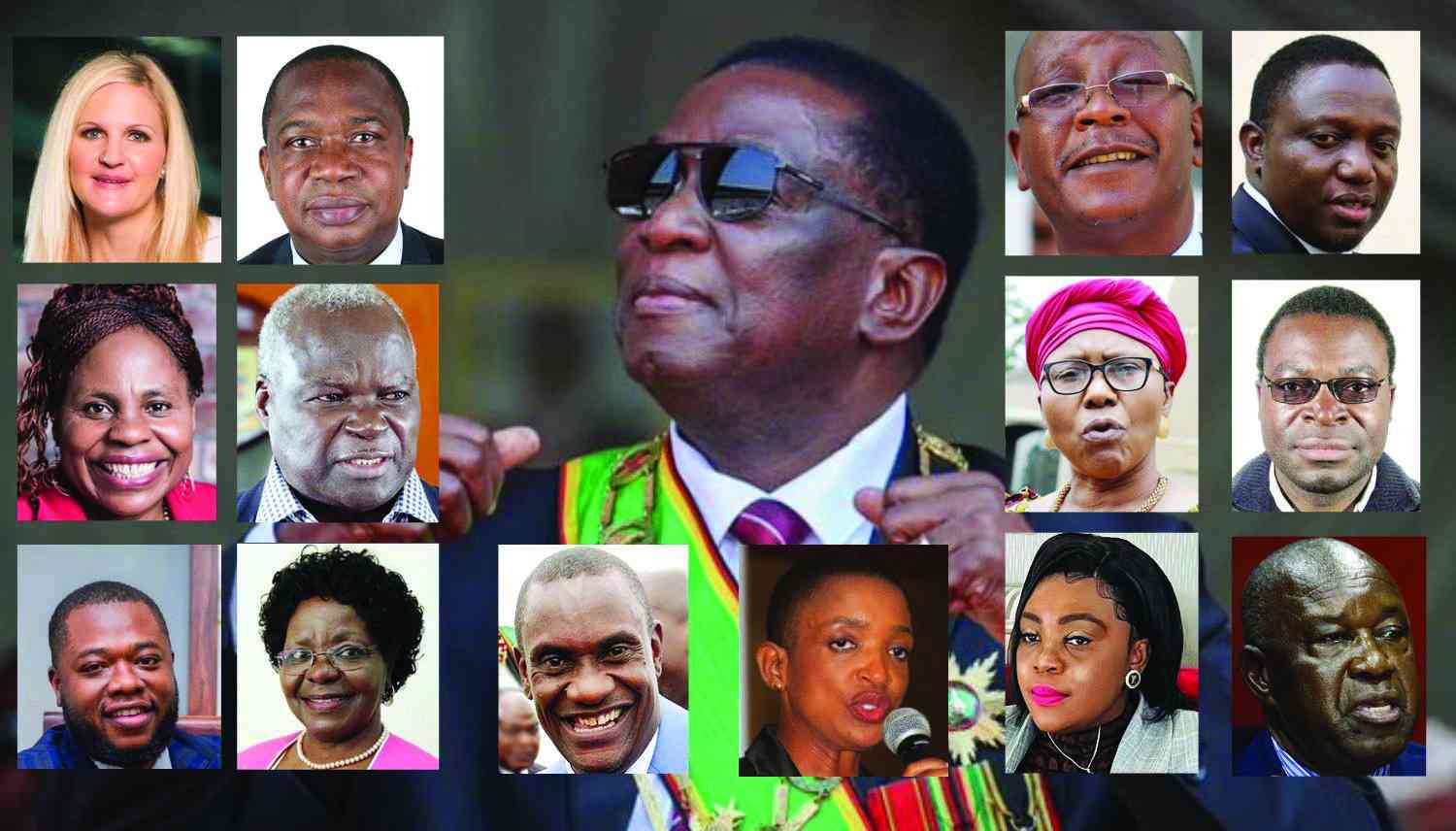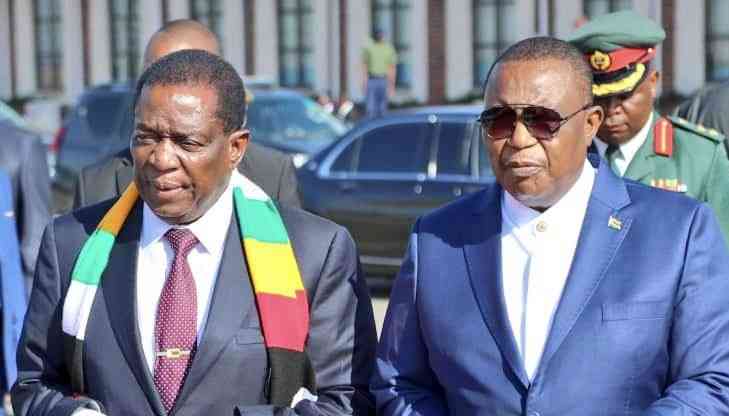
THE cabinet appointed by President Emmerson Mnangagwa as he begins his second and last term has predictably dominated political conversations in the past week.
His supporters have been singing praises as usual, a cacophony of voices singing for their supper. And his detractors have been pointing at everything that is wrong about his appointments — which is plenty.
As this is the team on whose shoulders the fortunes of Zimbabwe rest, I find it a matter of national duty to add my two cents to the discourse. A cabinet is the strongest indicator of the government's direction.
As such, I will address its character and content and, most importantly, attempt to apply political logic to the appointments.
Something right on the appointments
The cabinet has a mix of the old guard and the younger generation, a composition obviated by the generational transition currently happening in Zanu PF at the parliamentary level.
This gives a healthy balance between having steady hands on deck and bringing in new energy and fresh ideas, creating an intergenerational mix. It also bolsters the ‘reformist’ robes Mnangagwa has been clothed in since the new dispensation took office in 2018.
Of course, the colours of those robes are full of contradictions — fodder for another day.
- Budget dampens workers’ hopes
- Govt issues $24 billion Covid-19 guarantees
- Letter to my People:They have no answers for Nero’s charisma
- ZMX to enhance farm profitability
Keep Reading
Like the previous cabinet, he has retained technocrats like Mthuli Ncube, Mangaliso Ndlovu, Anxious Masuka and Fredrick Shava, amongst others, which points to a desire to turn around the social, economic and diplomatic position of the country.
Whether that is enough to provide the impetus for salvaging the fortunes of the nation remains subject to debate, but that intention is discernible.
The blight of the new cabinet
For the umpteenth time, the cabinet falls far short of reflecting our society in terms of gender. While women represent more than 50% of our population, in cabinet, there are 12 women out of 53 appointments (ministers and deputy ministers).
The gender disparity of the cabinet is a perpetual bane that does not seem to find priority in the minds of those who appoint. Of course, you would protest, dear reader, that the President had limited options as there is a low number of women in parliament, where the President draws the bulk of his appointments.
But then, he has the latitude to appoint up to seven non-parliamentary members — a provision which is constantly overlooked only to write corrections after the announcement.
In addition to bringing in technocrats with specific skill sets, that provision can also be used to bolster the number of females in cabinet. And to kill two birds with one stone (no offense to the avian community), the appointed technocrats can actually be women!
I have read several accolades being showered about the number of appointments from Matabeleland presented as significant. It is not significant. It is only 7 (ministers and deputy ministers), 11 if one adds provincial ministers, but they do not sit in cabinet! While it is a much higher number than any in recent memory, it still falls far short.
It would be amiss not to point to the brazen nepotism personified by appointing the President’s son and nephew as deputy ministers. While interpretations have been made to the effect that this is an attempt at creating a dynasty, one must also read it within the frame of securing the family fortunes after Mnangagwa leaves power in the long term, providing the family proximity to power and access to patronage networks.
Size matters
One problem with the appointed cabinet is its size. It is hardly justifiable for a small country like ours, with a small annual budget of circa US$5 billion, to have 26 ministries with a total of 53 appointments and 10 provincial ministers!
While the ministries were already too many in the last term, with some overlaps and duplications, the new cabinet has further balkanised them, creating a whole ministry portfolio that could otherwise be a department under a ministry.
The Ministry of War Veterans and the Ministry of Skills Audit are such unnecessary creation of mountains out of molehills.
The sheer size and balkanisation of this cabinet is a case of, as Bakalanga would say ‘Bana benkadzi bano pemhulilana n’holo wemhaho bekakwana’ (siblings would divide the head of a locust and all get something).
The appointment of the president’s close family members into the cabinet also has expression in the rich folklore of my people, ‘Tjawawana idla nehama, ntaya unahangan’wa’ (whatever you get, share with family, outsiders have a short memory). It is indeed a case of creating jobs for the boys — literally.
The ‘skills’ circus deepens
Every sane person would agree that skills are an important aspect of national manpower development. And in this era of rapid technological advancements, a lot of skills are fast becoming redundant pointing the need to audit and reskill. But to create a whole ministry for that when there are already two education ministries within which a skills department naturally falls is not smart.
It looks like ‘skills’ are usually the fall guy when one wants to accommodate one more loyalist. Remember Robert Mugabe once had a ‘ministry of psychomotor activities’! If we cut the extravagant nomenclature dear reader, it means it was a ministry for cognitive skills within the education system manned by one Honourable Josiah Hungwe! Believe me, it was as ridiculous then, as it sounds now.
The political logic behind the cabinet
Cabinet appointments are informed and influenced by political logic. To put politics and logic in the same sentence is an oxymoron as that arena is notorious for defying common logic.
But then, it does have its own exceptionalism where logic is concerned. The political logic behind cabinet appointments is based on various considerations, including policy priorities, political dynamics and interests, as well as regional, ethnic, gender and factional balance.
For a President in his second and last term as per the constitution (and also self-affirmed by Mnangagwa himself) issues of legacy are also at the centre of cabinet appointments.
Some cabinet appointments are more for optics than for policy formulation or delivery. It is to present a certain character of the government and that would explain the continued inclusion of Honourable Kirsty Coventry as the token white face in the cabinet.
Policy priorities
President Mnangagwa has made it clear throughout his campaign that he is running on his first term record. As such, he perceives the performance of his government in the past five years as largely excellent, a point he cynically made during cabinet announcements.
As such, he has retained ministers in key ministries, a strong indication that he prioritises continuity in his policy direction and stability. So, he did not rock the boat in a manner of speaking.
The retention of ministers like Mthuli Ncube, Anxious Masuka, Fredrick Shava, Mangaliso Ndhlovu, Oppah Muchinguri-Kashiri, and July Moyo suggests that the bulwark of his second term is focused on economic recovery, re-engagement, climate diplomacy, food security and stability.
These are key in seeking to end Zimbabwe’s intractable economic crisis at home and its pariah status abroad and reaping the associated benefits.
The finance minister has his work cut out for him. On the other hand, with the shadow of the damning Election Observer Mission Reports still towering over the country, the Minister of Foreign Affairs has the monumental task of laundering the dispensation’s image in the region and further afield.
Political considerations
The composition and character of the cabinet must also be read and understood within the ambit of the stage at which the dispensation is. The dispensation has come full circle since 2017 from first reconfiguring the ruling coalition and dispensing patronage and rents, whose logic was to integrate the coup actors. It went further to the state of consolidating power through centralization and purging rivals.
It is now at the factionalisation stage in which the elites renegotiate power relations. Tactical alliances are created, and rival factions emerge. This precedes an impending crisis stage similar to what we saw in 2017, where the centre cannot hold, and the ruling coalition fractures.
The logic of that stage will be the replacement of the leader in the successionist political arena. It is still early days to see how factions organise internally. Still, these conditions are created by the fact that according to the Constitution, it is Mnangagwa’s last term unless the constitution is amended.
Either way, there are legitimate expectations for ambitious politicians to begin to position themselves for succession or to challenge any delay to the departure of the incumbent.
As such, cabinet appointments present the best shot for factions to position themselves within the cusp of power. Therefore, this cabinet's composition suggests that tactical alliances are being created and rival factions are forming.
We are entering the territory of successionist politics. I will explore this strand further in a future instalment — hopefully.
Attempt at legacy?
Politicians are a fascinating species with a big but fragile ego. They want to be remembered, and since they cannot be around forever, they want to etch their name into the nation's memory by creating a legacy.
President Mnangagwa has touted himself as a reformer from day one, and his adherents have been harping on that narrative incessantly — pestilentially even. My point here is not to debate the credence of this notion but to read it from his cabinet appointments.
For what it is worth, his choice of Finance and Foreign Affairs ministers points to two intertwined intentions defining his legacy. He wants to be remembered as the president who reformed and turned around the economy and one who also reformed and rehabilitated Zimbabwe’s image abroad, ending its pariah status.
The CCC must shadow this cabinet
While CCC is in opposition and has no say in cabinet appointments, it still has an important role to play. It must move beyond just criticising the appointed cabinet to shadowing it.
This helps intentionally develop and articulate policy alternatives, pressure the government to deliver, and, most importantly, signal that it is also a government in waiting. Chamisa would do well to appoint a shadow cabinet as well as deploy competent MPs in specific Parliamentary Portfolio Committees to provide strong oversight on these ministries.
The sober view
The character and composition of the current cabinet must be understood within the frame of policy priorities, political considerations, the emergence of factionalism in anticipation of the incumbent’s departure in 2028, the attempt, and desire to create a legacy. On the policy front, we must anticipate more of the same, as continuity seems to be the goal on that count. However, on the political side, we must anticipate business unusual as the centre fails to hold and successionist politics take centre stage.
The dreadful outcome of this is that it will asphyxiate government business. Delivery will be relegated to the back banner as government programmes become instrumentalised to oil the wheels of factions. We saw this during Mugabe’s last term, and it is inevitable now.
This is my sober view; I take no prisoners.
- Dumani is an independent political analyst. He writes in his personal capacity. Twitter - @NtandoDumani






